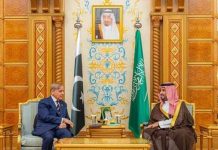Karachi, /DNA/ – Pakistan Businesses Forum (PBF) urged that the European Commission and Pakistan may launch the EU-Pakistan Trade and Technology Council to allow both partners to tackle challenges at the nexus of trade, trusted technology and security, and thus deepen cooperation in these fields between the EU and Pakistan.
Talking to delegation of the business community on Monday, PBF Vice President, Ahmad Jawad said Europe is Pakistan’s second most important trading partner, accounting for 14.3% of Pakistan’s total trade in 2020 and absorbing 28% of Pakistan’s total exports.
Commerce Division may identify other export opportunities and inform investors and the public about them so that more people can take part in the value creation process. Similarly, there are many other opportunities available in the supply chain of many finished products like in untapped sector of horticulture which was constantly ignored precisely for EU.
In 2020, Pakistan was the EU’s 42nd largest trading partner in goods accounting for 0.3% of EU trade. Pakistani exports to the EU are dominated by textiles and clothing, accounting for 75.2% of Pakistan’s total exports to the EU in 2020.
Pakistan’s imports from the EU are mainly comprised of machinery and transport equipment (33.5% in 2020) as well as chemicals (22.2% in 2020). From 2010 to 2020, EU-27 imports from Pakistan have almost doubled from €3,072 to €5,537 million. The growth of imports from Pakistan has been particularly fast since the award of GSP+ (€5,515 million in 2014).
Though Pakistan’s economy holds considerable potential, high costs of doing business, complex regulation and infrastructure bottlenecks all have a detrimental effect on trade and growth. Pakistan’s trade regime and regulatory environment still remain comparatively restrictive.
Textiles and clothing account for over 80% of Pakistan’s exports to the EU. While the textiles and clothing industry are the backbone of Pakistani exports, relying so heavily on one product category carries risks for Pakistan. Trade diversification would play an essential role in this respect. The granting of GSP+ preferences in 2014 should stimulate Pakistan’s efforts towards diversification.
Ahmad Jawad further viewed we should aim to mature our trade ties with the US and Europe beyond politics. Pakistan’s diplomatic relationships must be based on shared interests with each country. There are several examples of countries whose economic links remain intact despite political or border conflicts. For instance, in 2021, overall trade between China and India stood at $125.66 billion, up 43.3 percent from the previous year. During this time, there have been numerous military and political scuffles between India and China over Ladakh. The Ladakh impasse had entirely halted cooperation on all fronts except trade at the time.
He also told the EU is a full toolbox of solutions, they have a lot of peacekeeping missions and bureaucratic exchanges which can help us.

















